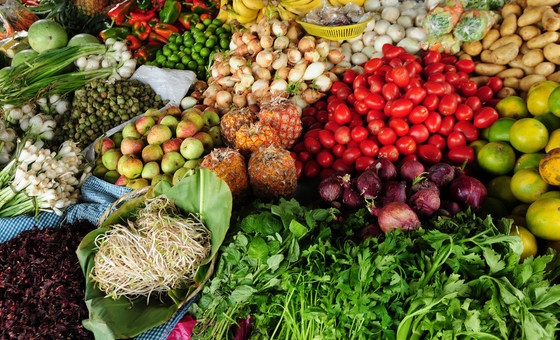One Third of Poorer Countries Face both Undernutrition and Obesity: WHO Report
UNITED NATIONS, 23 Dec 2019
UN News – TRANSCEND Media Service
With one in three low and middle-income countries facing the two extremes of malnutrition – undernutrition and obesity – the UN’s health agency WHO is calling for a new approach to deal with rapidly changing food systems.
16 Dec 2019 – A new report, published in the British medical science publication The Lancet on Monday, suggests that, globally, almost 2.3 billion children and adults are overweight, and more than 150 million children are stunted, and warns that undernutrition and obesity can lead to effects across generations.
“We are facing a new nutrition reality. All relevant policies and investments must be radically re-examined.”
— Francesco Branca, Director of the Department of Nutrition for Health and Development, WHO
“We are facing a new nutrition reality,” said lead author of the report Dr Francesco Branca, Director of the Department of Nutrition for Health and Development at the WHO. “We can no longer characterize countries as low-income and undernourished, or high-income and only concerned with obesity”.
“All forms of malnutrition have a common denominator – food systems that fail to provide all people with healthy, safe, affordable, and sustainable diets. Changing this will require action across food systems – from production and processing, through trade and distribution, pricing, marketing, and labelling, to consumption and waste. All relevant policies and investments must be radically re-examined.”
Fruit, Veg, and Less Meat
The report recommends high-quality diets to restrict both undernutrition and obesity. Elements include optimal breastfeeding practices in the first two years; fruits and vegetables, grains and seeds; cutting back on meat; and avoiding food with high levels of suger, saturated fat, trans fat, and salt.
However, food systems in many countries are seeing increased availability of ultra-processed foods that are linked to increased weight gain; fewer fresh food markets; and the control of the food chain by supermarkets: eating unhealthy food is increasing the risk of non-communicable diseases, such as type 2 diabetes (now a global epidemic), high blood pressure, stroke, and cardiovascular disease.
Health Programmes Not Fit for Purpose
The report declares that action to address malnutrition has historically not taken account key factors, including early-life nutrition, diet quality, socioeconomic factors, and food environments.
In fact, some programmes addressing undernutrition may have unintentionally increased the risk for obesity and diet-related non-communicable diseases, in low-income and middle-income countries where food environments are changing rapidly.
Examples of actions that can deal with undernutrition and obesity range from improved antenatal care and breastfeeding practices, to social welfare, and to new agricultural and food system policies which have healthy diets as their primary goal.
The authors of the report called on governments, international organizations and the private sector to invite new areas of society, such as grass-roots organizations, farmers and innovators, to join them in a fresh bid to address the double burden of malnutrition.
“Without a profound food system transformation”, said Dr. Branca, “the economic, social, and environmental costs of inaction will hinder the growth and development of individuals and societies for decades to come.”
Tags: Fast Food, Health, Junk Food, Obesity, Poverty, Public Health, Undernutrition, United Nations
DISCLAIMER: The statements, views and opinions expressed in pieces republished here are solely those of the authors and do not necessarily represent those of TMS. In accordance with title 17 U.S.C. section 107, this material is distributed without profit to those who have expressed a prior interest in receiving the included information for research and educational purposes. TMS has no affiliation whatsoever with the originator of this article nor is TMS endorsed or sponsored by the originator. “GO TO ORIGINAL” links are provided as a convenience to our readers and allow for verification of authenticity. However, as originating pages are often updated by their originating host sites, the versions posted may not match the versions our readers view when clicking the “GO TO ORIGINAL” links. This site contains copyrighted material the use of which has not always been specifically authorized by the copyright owner. We are making such material available in our efforts to advance understanding of environmental, political, human rights, economic, democracy, scientific, and social justice issues, etc. We believe this constitutes a ‘fair use’ of any such copyrighted material as provided for in section 107 of the US Copyright Law. In accordance with Title 17 U.S.C. Section 107, the material on this site is distributed without profit to those who have expressed a prior interest in receiving the included information for research and educational purposes. For more information go to: http://www.law.cornell.edu/uscode/17/107.shtml. If you wish to use copyrighted material from this site for purposes of your own that go beyond ‘fair use’, you must obtain permission from the copyright owner.


